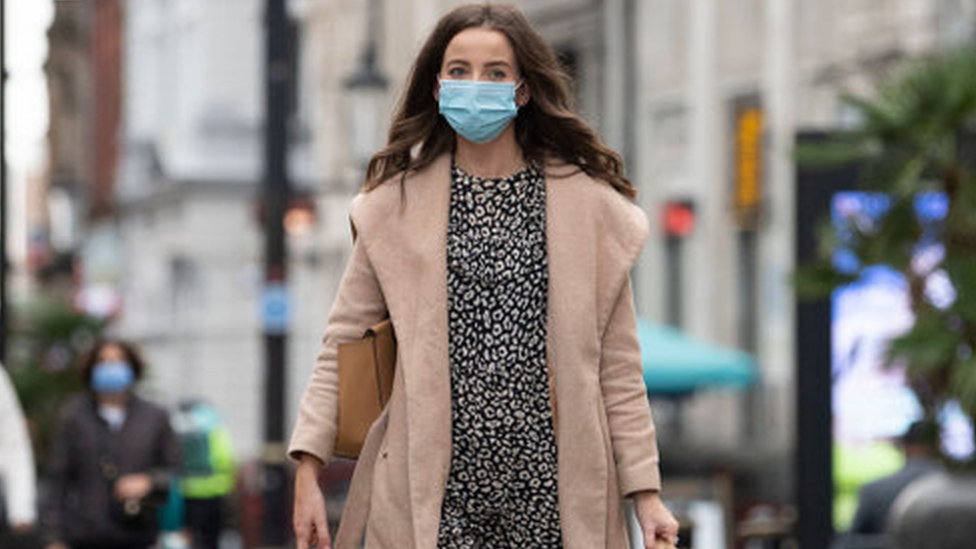Covid Inquiry in Wales: Week two's 'extraordinary' surprise
- Published
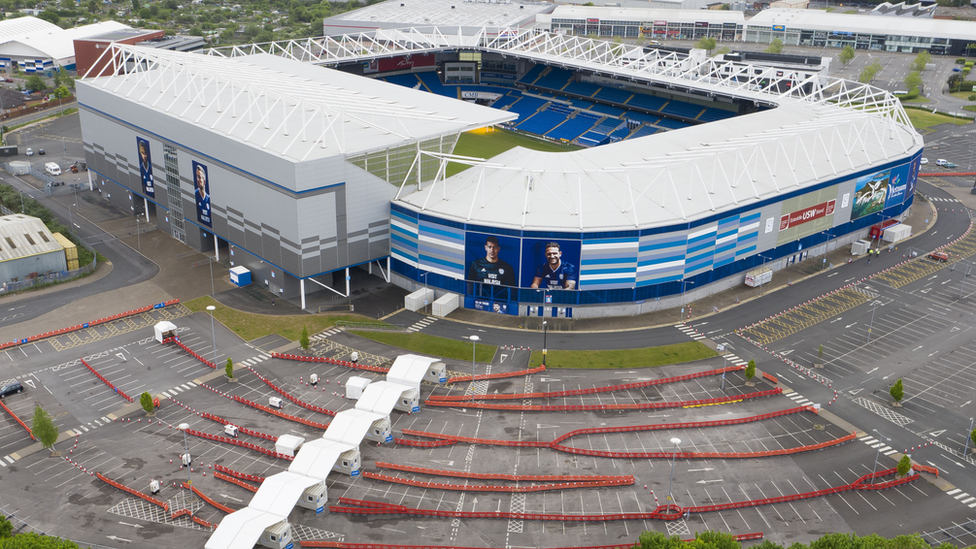
The UK government commissioned a mass Covid testing centre at Cardiff City Stadium, without telling the Welsh government or Public Health Wales
The UK Covid Inquiry has spent a second week in Cardiff examining how the Welsh government handled the pandemic.
And again, it had its fair share of remarkable "mic drop" moments.
At one point a surprised inquiry chair Baroness Hallett had to ask a senior health official: "Did I hear you correctly?" And, yes, she had done. "Extraordinary," came the response.
The inquiry is looking at the decision-making of governments for the UK, Wales, Scotland and Northern Ireland.
Cruise ship-sized warning
Early in February 2020, the giant Diamond Princess cruise ship moored in Japan caught the world's attention as cases of Covid were confirmed on board.
Tests carried out on the quarantined passengers and crew showed most of those with the virus didn't show symptoms. This went against what the world thought it understood about Covid-19 at the time and it would take a few months before full scientific studies were concluded, external.
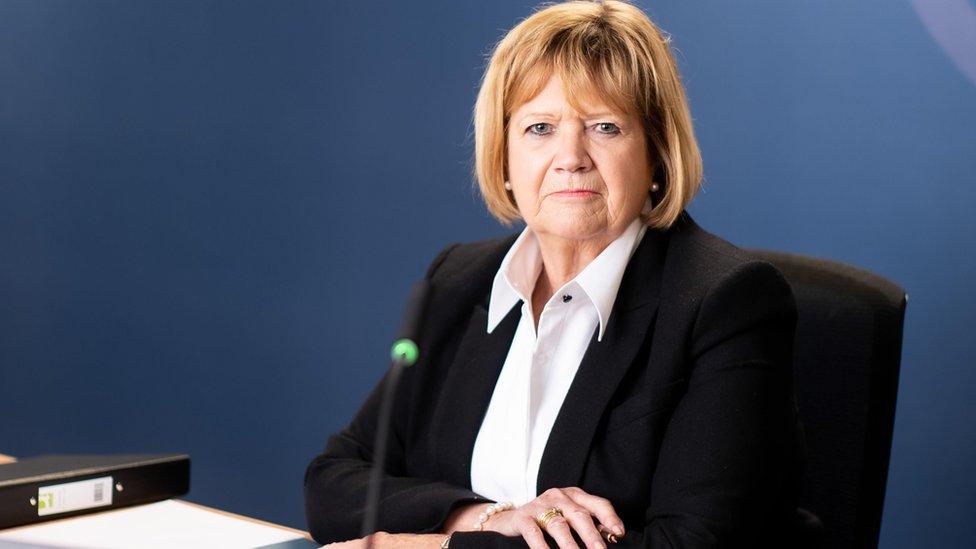
Baroness Hallett, chair of the Covid Inquiry, made it clear she does not much care for jargon
However, for those watching in Wales and beyond it served as an early warning that only testing people with symptoms may not be enough. When he was questioned about Wales' policy of not testing patients as they were discharged from hospital until May 2020, Dr Goodall was asked about the Diamond Princess.
He confirmed that he was aware of the ship and reports of that asymptomatic transmission were possible but said that it did not stand out to him at the time.
Lockdown was war-gamed
When the first lockdown was announced on 23 March 2020 it felt like a sudden shift in national life that caught many by surprise.
This week we learned that, 20 days before lockdown, Welsh health officials and police in south Wales had come together to stress-test what a lockdown would involve.
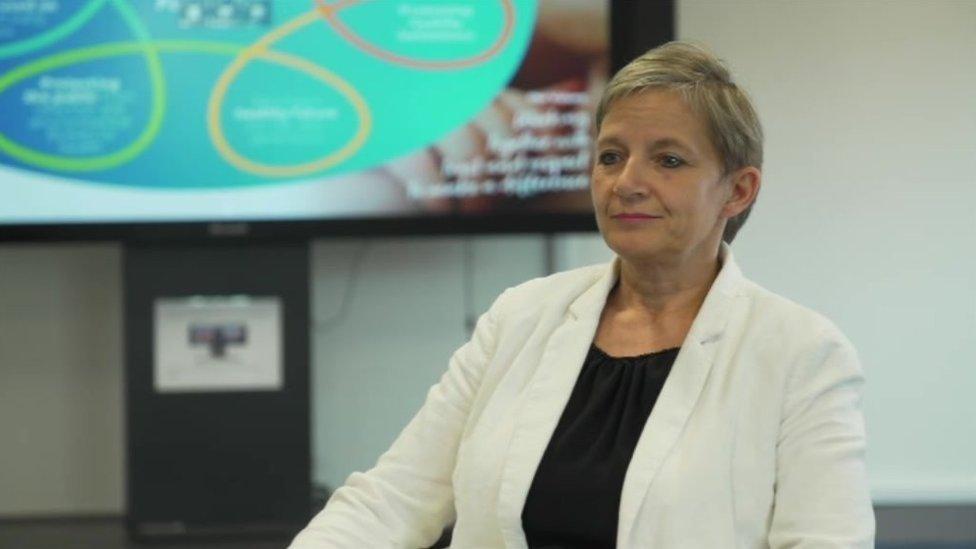
Tracey Cooper of Public Health Wales was involved in a "stress-test" exercise before the first lockdown
Public Health Wales chief executive Tracey Cooper said the "Seren City" exercise on 3 March was a face-to-face meeting that worked though gaps in the system.
It rapidly found there were questions over whether the right laws were in place, how the public would respond and who controlled the supply of PPE (personal protective equipment) - all issues that would become very real within a matter of weeks when the first lockdown was imposed.
WhatsApp worries
We have heard a lot in the inquiry about the use and deletion of WhatsApp messages by ministers and officials.
In her evidence Dame Shan Morgan, the Welsh government's former permanent secretary, was asked about concerns raised with her as far back as October 2020 over inappropriate use of WhatsApp.
A message was circulated within Welsh government suggesting some senior staff were asking people to use the app on their personal phones for work purposes.
The memo went on to raise concerns that some may feel "pressurised by line managers to breach the policy" or "left out of work-related discussions if they do not breach the policy".
It concluded "these behaviours must stop".
Evidence shows some officials carried on using WhatsApp to discuss work. First Minister Mark Drakeford's special adviser Jane Runeckles was pressed on her claim she had only used the app for "admin" and "morale".
"But isn't using your personal phone for admin purposes using it for Welsh government business?" asked the chair, Baroness Hallett.
"Yes," came the reply.
"So you were using it wrongly?"
"Yes."
Baroness Hallett doesn't like jargon
Civil servants are not famed for their frankness. It's often part of their role to make diplomatic - some would say dry, technical - statements.
However, it's clear Baroness Hallett wants straight answers.
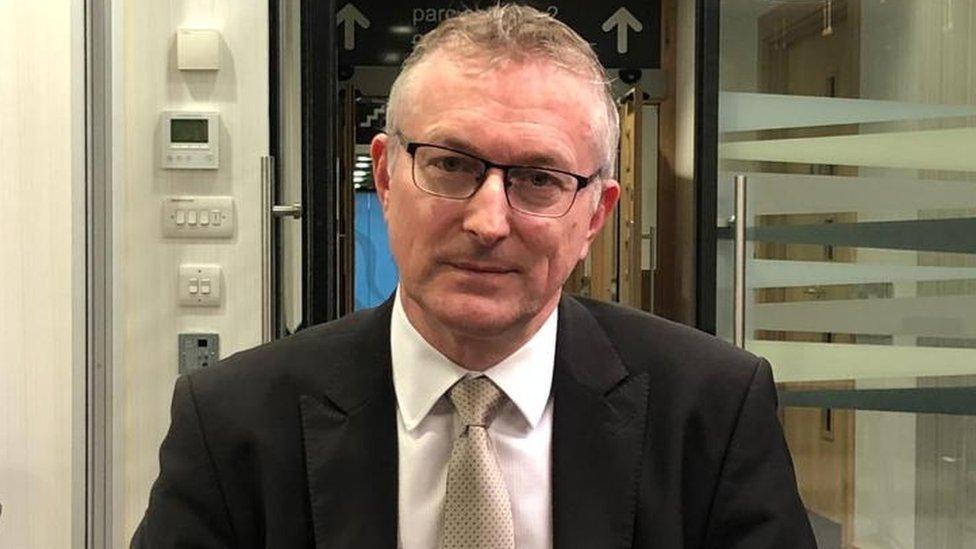
Dr Andrew Goodall, NHS Wales chief executive in the pandemic, was asked what he meant by "reasonable worst-case scenarios were worked through"
When Wales' top civil servant Andrew Goodall was questioned about the Welsh government's actions early in March 2020, he said that "reasonable worst-case scenarios were worked through". Baroness Hallett was not happy.
"I'm sorry to interrupt," she said. "Again, what did you do? Apart from set up groups, talk about business continuity with weekly calls, what did you do?"
When Mr Goodall replied that the response involved "working through weekly NHS capacity plans," she still was not satisfied, asking again: "What does that mean you were doing?"
Explanations by the man leading the Welsh government's emergency response, Reg Kilpatrick, drew similar interjections. "I didn't really understand that answer," Baroness Hallett said as Mr Kilpatrick was asked what his team's "gradual mobilisation" entailed.
"Was it meeting?" she asked.
"It was not physically co-located," came the response.
Exasperated by the jargon, she gave it one last try: "I'm sorry, was it meeting?"
The exchange ended with an eye-roll.
The 'extraordinary' surprise
As the virus started to spread in 2020, there was a scramble for Covid testing kits and places where people could be swabbed.
By the beginning of April, Public Health Wales had developed a test but capacity was low.
It therefore came as a bit of a shock when it was told that a private company, commissioned by the UK government, had been setting up a mass sampling centre in the car park of Cardiff City Stadium, without its knowledge.
"Unfortunately, neither ourselves or the Welsh government knew about that," Dr Tracey Cooper of PHW told the inquiry, as she explained that within days her team had to staff and run the drive-through centre for a couple of months.
This really caught Baroness Hallett's attention. "Did I hear you correctly?" she asked.
Indeed she had, although Dr Cooper did not know whose decision it had been to set up the Cardiff centre. "Extraordinary," said the chair.
The story of the surprise test centre can be seen in two ways: either as an example of resources being rapidly pumped into Wales without being caught up in the usual paperwork - or as a vivid illustration of how confused and un-coordinated the pandemic response could be in those early months.
- Published2 March 2024
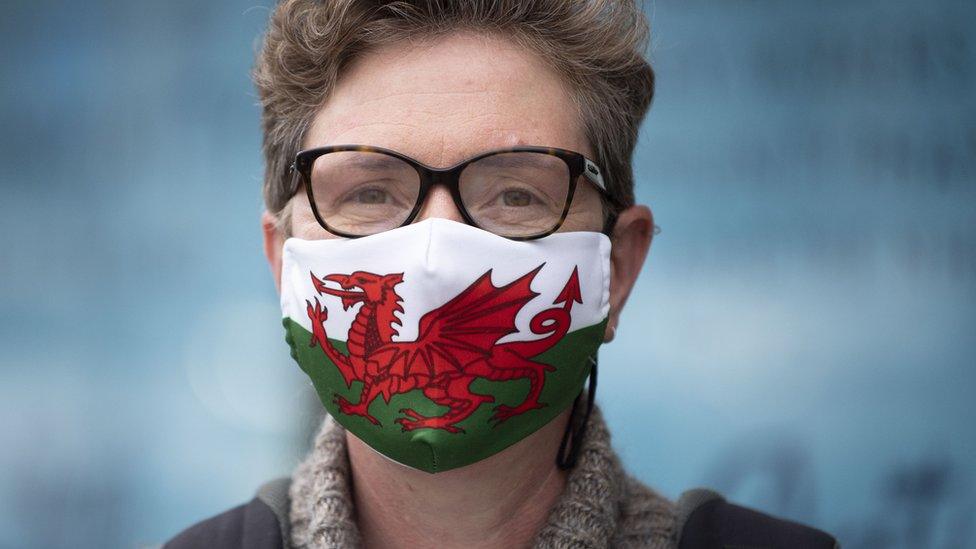
- Published27 February 2024
